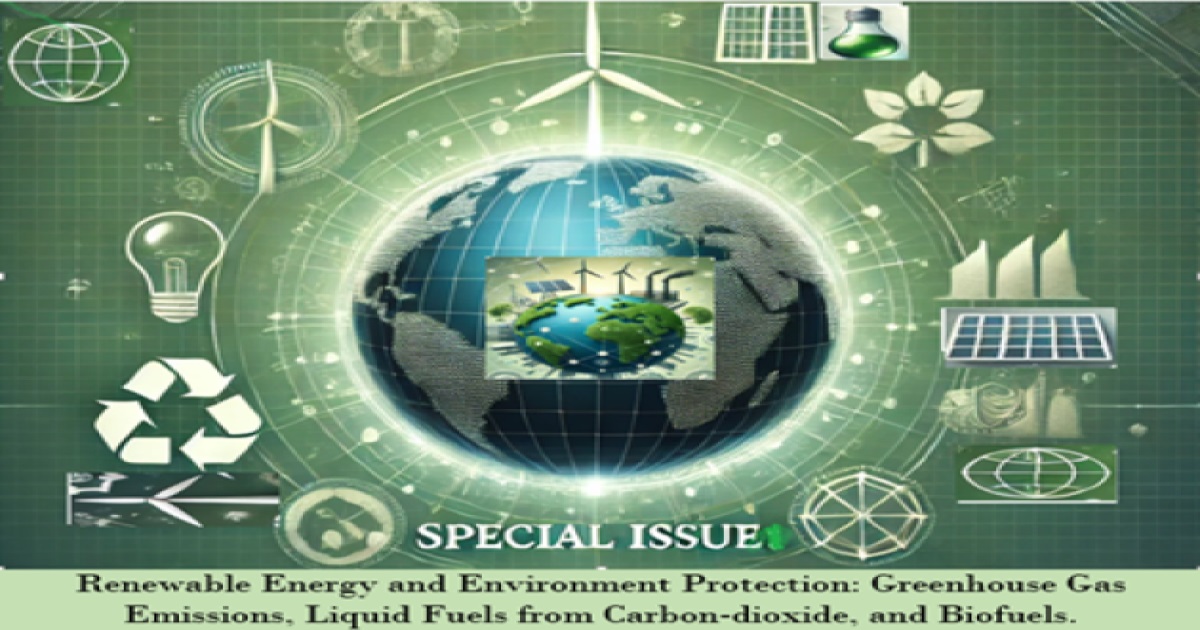Renewable Energy and Environment Protection: Greenhouse Gas Emissions, Liquid Fuels from Carbon Dioxide, and Biofuels
A special issue of Sustainability (ISSN 2071-1050). This special issue belongs to the section "Energy Sustainability".
Deadline for manuscript submissions: 31 January 2026 | Viewed by 6068

Special Issue Editors
Interests: electrochemical energy harvesting and storage; biofuels
Special Issues, Collections and Topics in MDPI journals
Special Issue Information
Dear Colleagues,
This Special Issue focuses on recent advances and cutting-edge developments in renewable energy research and environmental protection, with a particular emphasis on the challenges and opportunities associated with decreasing energy consumption in industrial production. The importance of efficient energy management and optimization systems to minimize waste products and reduce the overall carbon footprint will be addressed. In this context, direct air capture (DAC) and the storage of carbon dioxide to then convert it into liquid fuels emerge as key solutions. This process presents a dual benefit: it helps to mitigate the impact of greenhouse gas emissions and provides a pathway for securing the sustainable production of liquid fuels, which are essential for sectors that are difficult to electrify. In addition, this issue addresses innovative methods for the production of green hydrogen and biofuels, which are increasingly important in the transition to cleaner energies. Biofuels, derived from organic materials, offer a renewable alternative to fossil fuels and are crucial in reducing the carbon intensity of transportation and other sectors. A novel aspect explored in this issue is the integration of artificial intelligence (AI) in the energy sector to optimize the production, storage, and utilization of alternative energy sources. AI-driven technologies enable more efficient energy management, the predictive maintenance of energy systems, and the real-time optimization of energy usage, thereby maximizing the benefits of renewable energy sources while minimizing waste and inefficiencies.
By linking technological innovations with strategic industrial and governmental actions, the issue provides a comprehensive view of how emerging technologies like DAC, green hydrogen, and AI; therefore, it can contribute to the global transition toward cleaner and more sustainable energy systems.
The overall focus of this issue is to document the recent progress achieved in renewable energy research and in environment protection.
Focus: The primary focus of this Special Issue is to document the recent progress achieved in renewable energy research and environmental protection. It seeks to highlight how emerging technologies, particularly in the fields of energy management, carbon capture, and renewable fuel production, are driving advancements toward a more sustainable future.
Scope: The issue covers a wide range of topics, including energy optimization in industrial processes, the development of innovative technologies, such as DAC, green hydrogen production, and the integration of AI in energy systems. It also explores the implications of these technologies for reducing carbon footprints and promoting environmental sustainability.
Purpose: The purpose of this Special Issue is to provide a comprehensive overview of the latest technological and strategic developments in the field of renewable energy. By linking these advancements with global efforts in environmental protection, the issue aims to foster a deeper understanding of the critical role that these technologies play in the global transition toward a cleaner, more sustainable energy landscape.
How does the Special Issue supplement the existing literature in the field? We will address the increasing role played by AI in the energy sector and in supporting and advancing sustainability and environmental protection. The development of large-scale redox flow batteries and the generation of biomass energy are priorities in the field. Also, the issue will discuss how the energy industry can interact directly with the global government, company leaders, and decision-makers who are responsible for strategically important resolutions.
Prof. Dr. Daniel A. Lowy
Dr. Jesus R. Melendez
Guest Editors
Manuscript Submission Information
Manuscripts should be submitted online at www.mdpi.com by registering and logging in to this website. Once you are registered, click here to go to the submission form. Manuscripts can be submitted until the deadline. All submissions that pass pre-check are peer-reviewed. Accepted papers will be published continuously in the journal (as soon as accepted) and will be listed together on the special issue website. Research articles, review articles as well as short communications are invited. For planned papers, a title and short abstract (about 250 words) can be sent to the Editorial Office for assessment.
Submitted manuscripts should not have been published previously, nor be under consideration for publication elsewhere (except conference proceedings papers). All manuscripts are thoroughly refereed through a single-blind peer-review process. A guide for authors and other relevant information for submission of manuscripts is available on the Instructions for Authors page. Sustainability is an international peer-reviewed open access semimonthly journal published by MDPI.
Please visit the Instructions for Authors page before submitting a manuscript. The Article Processing Charge (APC) for publication in this open access journal is 2400 CHF (Swiss Francs). Submitted papers should be well formatted and use good English. Authors may use MDPI's English editing service prior to publication or during author revisions.
Keywords
- challenge of energy transition
- renewable energy production
- energy storage
- biofuels
- green hydrogen
- biomass energy
- direct carbon capture and reduction of carbon dioxide
- AI in the optimization of alternative energy production
- storage and usage
Benefits of Publishing in a Special Issue
- Ease of navigation: Grouping papers by topic helps scholars navigate broad scope journals more efficiently.
- Greater discoverability: Special Issues support the reach and impact of scientific research. Articles in Special Issues are more discoverable and cited more frequently.
- Expansion of research network: Special Issues facilitate connections among authors, fostering scientific collaborations.
- External promotion: Articles in Special Issues are often promoted through the journal's social media, increasing their visibility.
- Reprint: MDPI Books provides the opportunity to republish successful Special Issues in book format, both online and in print.
Further information on MDPI's Special Issue policies can be found here.






